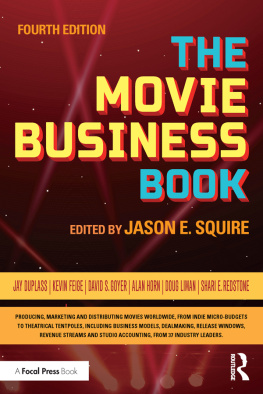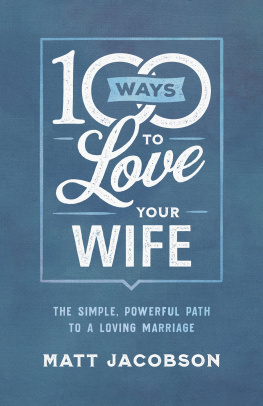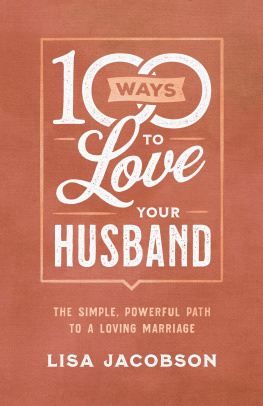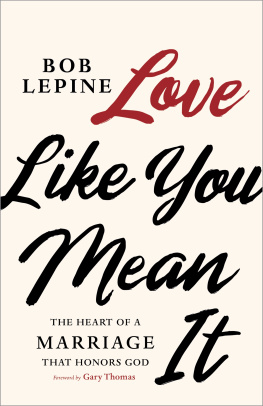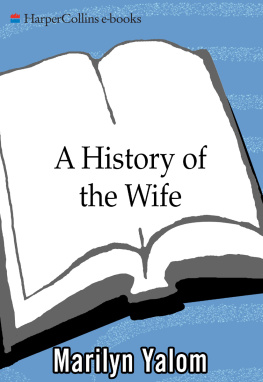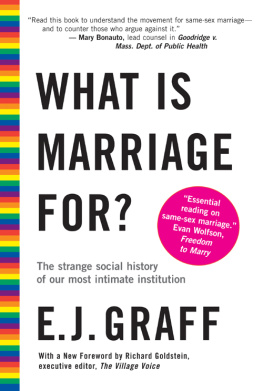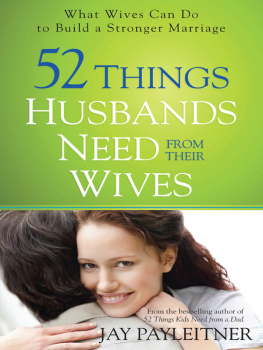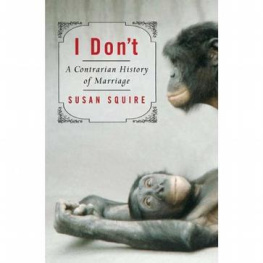I Dont
A CONTRARIAN HISTORY OF MARRIAGE
Susan Squire

For Namp
Marriage then... is what you call the monster?
Henry James, The Golden Bowl
Contents
TO call it lovemaking eons before anyone develops the idea of love, let alone links it to sex, would be absurd. In primal time there are no romantic delusions, no secret trysts, no promises, no privacy, no future plans. Theres only lust, followed by sexmindless sex, even for the creatures with minds.
So humans arent making love, not yet, but theyve already assumed the position without which lovemaking will be virtually unthinkable: belly to belly, length to length, face to face, eye to eye. And in this human proclivity for frontal sexfor making the beast with two backs, to use the crude Elizabethan phrase lies the potential for romance, emotional entanglement, erotic passion, and love love love, marital and extramarital.
In the future, who has sex with whom, and when, and where, and in what position will become a very complicated business indeed. What matters in primal time is survival, which depends on rapid reproduction, which depends on copulation unfettered by conscious thought. History will demonstrate ad nauseam that once sex becomes mindful and thereby meaningfulonce people figure out, for example, the cause-and-effect relationship between copulation and conceptionmaking the beast with two backs will be subject to impediments. This cant happen too soon, or we wouldnt be here. Evolutionary logic suggests that the endgame of sex escapes awareness until humankind nails survival. There will be plenty of time for impediments later on.
How much later? That question can be answered only speculatively, and loosely, by considering the archaeological timeline. The ability to make toolsa sign of rudimentary intelligence at workdates back about 2.5 million years. But theres a vast cognitive distance between putting together a spear and putting together something as abstract as, say, a mythological explanation of lifes origins, and it takes practically forever to close. Given that distance, and the fact that while maternity is obvious, paternity is not, people probably dont connect sex to reproduction for many hundreds of thousands (if not millions) of years.
By then, modern humans have fully evolved and subdivided into three races. Traveling in groups, or tribes, theyre on the move, fanning out from Africa around the globe. Some tribes have already settled around the great river valleys of the Near East, and others inhabit caves farther north in what is now Europe, but most remain nomadic; they follow the food supply wherever it leads.
Tribal members, men and women, pool their skills and their cunning to fend off the recurrent perils of common life. Their united struggle against starvation is waged on two fronts, animal and vegetableboth essential food sourcesby two different teams. Innate logic dictates that the labor be split along gender lines. Mens greater strength, higher muscle-to-fat ratio, and unencumbered biology obviously suit them to the rigors of hunting; the breeding cycle limits womens mobility (and when it bears fruit, compounds their tasks), making the job of gathering plants and grains best suited to them.
Crossover is possible. There may be the occasional woman who is rugged enough to haul a spear over treacherous terrain and whos also blessed with the acute vision to spot fast-moving prey, along with the sharp reflexes and sheer raw nerve to kill itor be killed. There may well be the occasional man who does better in the field than on the trail. Still, it seems safe to say that female hunters and male gatherers are about as representative of the tribal population as female breadwinners and male homemakers are of the average middle-class marriage today: not very.
But while men and women labor daily at different tasks in different places, as they will in the future, its likely that womens work has yet to be downgraded in comparison to mens; women themselves have yet to be downgraded in comparison to men. In the common struggle for survival they are mutually indispensable each sex contributes something essential that the other isnt equipped to procure or produce on its ownand therefore of relatively equal stature.
Everything is shared: food and water, fire and shelter, the care of children, and the grown-ups reproductive equipment. Men and women participate in a fluid, inclusive sexual system that anthropologists generally call group marriage. Its existence can only be assumed (this is prehistory, after all), but the musical- chair-like mating game the term describes is certainly feasible and even probablesimply because such an arrangement would favor survival. Biology alone inhibits mating, although only for women who are already pregnant; as long as there are other ovulating women available, mens work is never done.
Group marriage is plausible while sexual behavior remains uncivilized and instinctive, outside of conscious control. But once the mystery of conception is solved and the idea of ownership is born, it becomes untenable. Organized communal sex will never work againand not for lack of trying. Both the Marxist-inspired free love movement of the mid-i8oos and the open marriage idea
As it happens, the death knell for group marriage (and mindless sex) has already begun to ring. The gender parity that has presumably been the pattern for eons will be reconfigured in relative secondsa casualty of the civilizing process.
Lets say that sometime between 10,000 and 8,000 BCE, in the vicinity of the Mediterranean Sea, a wandering tribe hacks its way through dense underbrush. Upon emerging, these nomads stop dead in amazement. They stand at the edge of a field fertile beyond imagining, a vast edible tableau of golden grains and wheat begging to be harvested, and promising to yield more than enough food to feed everyone for a year. The air is warm, the soil is rich, the sun glitters. Why not stay for the nightand the next, and the next? The gatherers get busy gathering; the hunters, having investigated the verdant forests surrounding the open land and found them full of well-nourished animal life, get busy hunting (and saving time, too, without fruitless hours and days spent tracking elusive prey). Pretty soon the group concurs that chasing the food supply when its right in front of you, replenishing itself as fast as its consumed, no longer makes sense. The wandering days are over. The group settles down.
Global warming, of a sort, has made this new phase of human existence possible. The fourth, the longest and (so far) the last, Ice Age has ended. The frozen sheets, hundreds of feet thick, which had turned most of the northern hemisphere into a gigantic skating rink for the past hundred thousand years, have finally returned to their Arctic origins. The newly temperate worldwide climate brings hot, dry summers and cool, moist winters to the Near East, and umpteen generations of European cave dwellers migrating south in search of hospitable temperatures find their way there.
The change in the weather changes everything. It makes settled life possible and sparks the development of farming, which leads directly to an electrifying epiphanyan intellectual eureka moment of incalculable significance. Now that men have become sheperds rather than hunters, theyre able to observe animal behavior at close range, day after day. One day the lightbulb goes on.
Heres the scenario: A shepherd watches a ram trot over to a receptive ewe and mount her. When the act is completed, the ram doesnt lie down and go to sleep (as the man, given his druthers, might at such a moment). Instead, he mounts a new partnersometimes a dozen more before the days over. Several weeks later, the shepherd notices that the bellies of these same ewes appear to be swelling. The shepherd knows the likely result of this peculiarly female shape-shifting process, but until now has never guessed the cause. In lieu of evidence to the contrary, he assumed that baby making was self-generated by females and wholly unrelated to the sexual act. Suddenly, he gets it.


